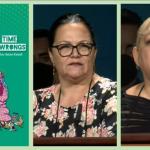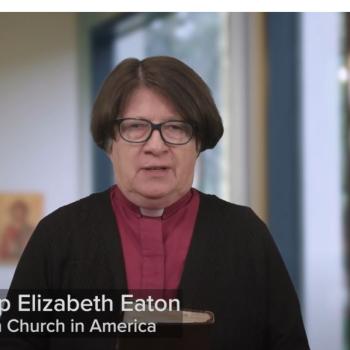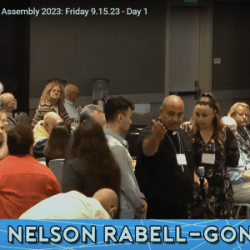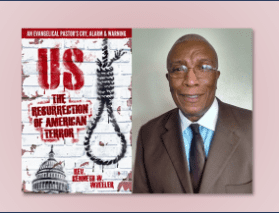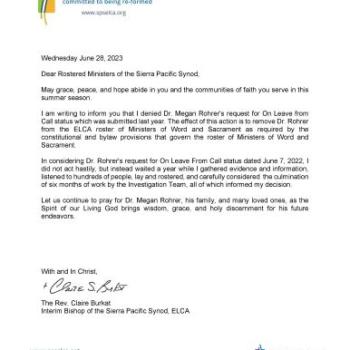The moment when Rev. Nelson Rabell’s congregation stood up against an abusive ecclesial system has turned into a movement for justice in the ELCA.
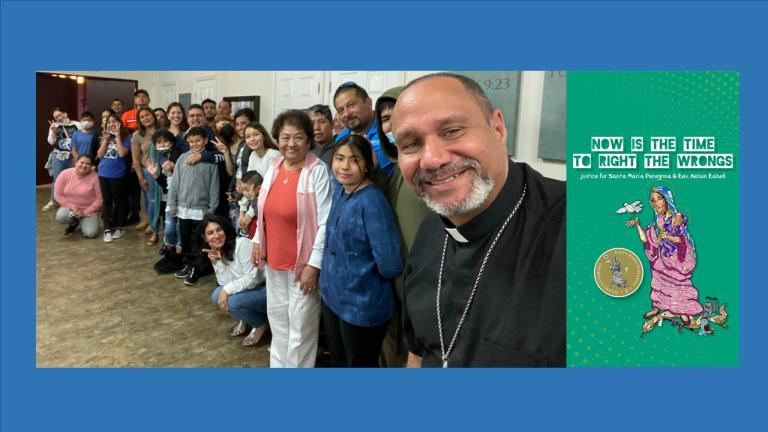
Over the last eight months, I have been chronicling the saga of Rev. Nelson Rabell González and his congregation, Iglesia Luterana Santa María Peregrina (Saint Mary the Pilgrim Lutheran Church). For this piece, one of his parishioners, Señor Jorge Carvajal, shared with me his experience of what happened to his congregation on Dec. 12, 2021. He has given me permission to share his story, but my words and opinions are my own.
The Moment
On December 12, 2021, Señor Jorge Carvajal and his wife Sandra walked into the church service of Misión Latina Luterana, in Stockton, Calif. The festive sounds of a Mariachi band danced through the air as people gathered for the high holy day of El Día de la Virgen de la Guadalupe. His church had planned for months to celebrate this sacred day commemorating the Virgin Mary appearing to Juan Diego nearly 500 years ago. Diego was a Mexican peasant who has become an icon for Indigenous, Mexican, and other Latiné peoples to celebrate their identity, dignity, and liberation. [Read more in this piece.]
On that afternoon as his fellow congregants gathered for this holy celebration, Sr. Carvajal passed the Aztec dancers dressed in colorful beaded clothes. Their chachayotls, rhythmic seed leggings, rattled joyously as they prepared to process into the sanctuary.
But he did not see his pastor, the Rev. Nelson Rabell González, who normally would be the first person to greet him when he came into the sanctuary. This seemed a little odd. He noticed another pastor, who happened to be one of the assistants to the bishop, sitting at the back of the church and asked her if she knew where Pastor Nelson was.
“She told me that he wouldn’t be in today,” Sr. Carvajal recalled. This concerned him, because Rev. Nelson had not communicated anything on Facebook about being absent. “I asked her if he was okay, but she just said he wouldn’t be there.”
Then, he saw another assistant to the bishop stand up to lead to service with then-bishop Megan Rohrer sitting in the chancel looking on. At first, he felt confused. The ceremonial procession by the Aztec dancers was cut short. “Everything seemed out of place,” he remembered. All through the service – the opening prayer, the Scripture readings, and the sermon – nothing seemed right. His confusion turned to gnawing questions.
He leaned over to ask two other people if they knew where Pastor Nelson was. “We heard he has been fired,” they whispered.
Fired? For what?
They didn’t know.
Then he called out the question.
In this video at minute mark 32:50 you can hear Sr. Carvajal call out: “Where is Pastor Nelson?” The assistant to the bishop told them they must wait until the end of the service to find out. The congregation became restless and agitated. Then the bishop stood to address them.
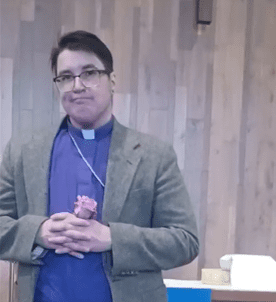
“There was such a feeling of disrespect from the bishop,” Sr. Carvajal recalled. “I have never felt so much racism and hate from someone.”
The congregation knew something terribly unjust had happened. And they would not sit for it.
People began shouting about the injustice done to their pastor and their community. They were angry that their pastor was missing without any explanation. And they refused to be treated like children – told to shush and wait.
“If he’s not here, we’re not going to be here!” someone yelled. “Vámonos!” others called out.
So, they picked up the statue of Mary, gathered up the flowers and the cross, and exited the sanctuary.
That is the day when the congregation began their pilgrimage, accompanied by Mary the Mother of Jesus.
They didn’t know it then, but that moment of standing up to injustice in the church would become a movement for justice in the ELCA.
That moment of racially-motivated injustice has highlighted the systemic racism within a denomination whose membership is 90% white (which I talk about in this piece). But the situation with Rev. Nelson has also revealed several other problems within the structural and ecclesial systems of the ELCA.
There are four overarching issues. One is the abuse of non-disclosure and non-disparagement agreements. A second is the misuse of On Leave From Call status for removing clergy from the roster. A third is the mistreatment of mission developers and congregations. And the fourth is the failure of the denomination to follow its own constitutional process for disciplinary procedures. I’ll say more about these issues further on.
From a moment to a movement
Since Dec. 12, there has been a constant barrage of unsubstantiated and false allegations, rumors, character assassinations, disinformation, and confusion about this very complex situation. Nevertheless, allies of Rev. Nelson and people of good will across the ELCA have advocated for justice for him and his church. And, on a larger scale, many have taken up the call to reform the denomination. Clergy and other rostered leaders, laity, and colleagues both within and outside of the ELCA have mounted campaigns to inform and organize. They have worked to educate, agitate, and legislate so that the underlying and often unseen problems that have enabled this fiasco — and others like it that have not received this level of attention — can be addressed and fixed.
In a matter of months, the movement to reform the ELCA resulted in memorials that were crafted, voted on, and passed in synods across the denomination. (Memorials and resolutions enable the ELCA to address broad policy issues or issues important to God’s mission in the world.) These memorials were then sent to the Churchwide Assembly (CWA), a triennial gathering of rostered and lay delegates that is the largest decision-making body of the ELCA. From Aug. 8 – 12, more than 800 people gathered in Columbus, Ohio, to worship, pray, deliberate, and decide on these memorials as well as other business of the denomination.
Organized for justice and reformation
Three groups in particular made their presence known during the CWA that were committed to see justice done for Rev. Nelson and his congregation, reform the denomination, and reconstruct its Constitution.
One group was #reformation2022 which was initially formed to address the secrecy around the forced resignation of former Bishop Viviane Thomas-Breitfeld in 2019. Many of the issues they addressed overlapped with the situation Rev. Nelson faced, including the use of NDAs, the treatment of clergy of color, and the disenfranchisement of vulnerable communities and people. By the time of the CWA, the #reformation2022 Facebook group had more than 1000 member, many of whom worked on memorials for synods and the Assembly.
Another group was Reconstitution2022. They formed out of the work of ten synods in the ELCA calling on the national office to rewrite the denomination’s Constitution and bring it into the 21st century. With its Facebook page of more than 800 followers garnered in less than two weeks before the CWA, the group pushed for congregations, synods, and Churchwide to have a central document that “holds our decisions together in justice and equity.”
A third was a small group of mission developers and allies of Rev. Nelson who traveled to CWA with flyers, buttons, and a poster with the tagline, “Now is the Time to Right the Wrongs,” featuring an illustration of Our Lady of Guadalupe. They urged voting members to support the memorials and to call for justice for Rev. Nelson, his family, and his congregation.
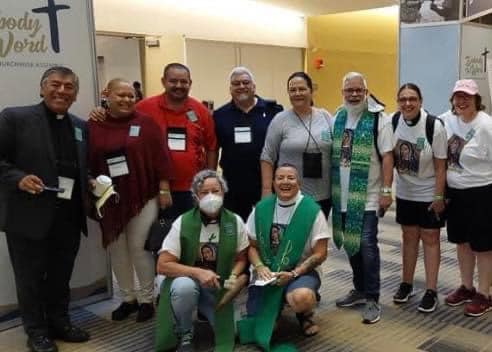
The Apology
On Aug. 9, the first day of the CWA, Presiding Bishop Elizabeth Eaton read an apology to a group of delegates from Iglesia Luterana Santa María Peregrina. While this public apology was a necessary first step, as of the writing of this piece, we have yet to see any concrete action for restitution and reparations. And for Sr. Carvajal, the gesture was “too little, too late.”
“I don’t buy any of it,” he said. “They should have stopped Rohrer right away and done an apology. If we hadn’t had that video of the service, and if Pastor Nelson wouldn’t have done so much work to raise awareness about what happened, they never would have investigated. It took way too long. They have no idea how helpless we felt. It’s like we were slapped in the face. The ELCA did a lot of damage.”
He and others are also concerned that Megan Rohrer remains on the roster of the ELCA. It has been two months since a disciplinary process was initiated in June. So far, there have been no updates on the status of the investigation.
Also, many have noted that the apology itself was devoid of any personal responsibility for what Bishop Eaton has done and left undone that contributed to the ever-worsening situation. Yet, the congregation’s response taught us a great deal about how to receive an insufficient apology, which I reflect on in this piece.
Where is Pastor Nelson?
Another thing that was noticeably absent from Bishop Eaton’s speech was any mention of an apology to Rev. Nelson and his family for what they have endured from this denomination and its three expressions – the churchwide, synodical, and congregational levels. Though she has finally agreed that a full investigation of his situation should be conducted, Bishop Eaton has not apologized for refusing to help Rev. Nelson when he first reached out to her for help in November 2021.
Or for neglecting to ensure that any support was offered to him and his family while dealing with the allegations and lack of due process.
Or for waiting three months to finally convene a Listening Panel to find out the truth about what happened on Dec. 12th.
Or for initially refusing to release the report and trying to bury it for an entire month.
Or for neglecting to intervene at the Sierra Pacific Synod Assembly when several people engaged in publicly slandering Rev. Rabell.
So, as I listened to the apology, I wanted to call out along with Sr. Carvajal: “Where is Pastor Nelson?”
Present through his absence
As I explained in my previous piece, though he had been invited to the CWA (after much hesitation on the part of the Presiding Bishop), Rev. Rabell felt it best for the focus to be on the congregation rather than the unresolved issues regarding the accusations against him. But in their response, his congregation reminded the Assembly of the need for prayers and justice for their pastor.
We ask all of you to keep Pastor Nelson Rabell-González in your prayers. We believe in his integrity and honesty. Our Pastor deserves a just and fair investigation process to bring closure to him and his family. We hope that this will finally be possible under the leadership of Sierra Pacific Synod Interim Bishop Claire Burkat.
Despite Rev. Nelson’s absence, however, the influence that his saga has had on the ELCA could be seen in numerous memorials that were affirmed by votes with overwhelming majorities at the Churchwide Assembly.
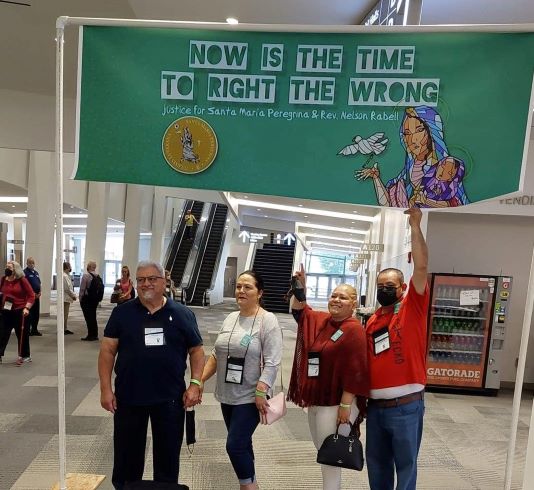
Memorial B8 limits NDAs
Memorial B8 addresses Separation Agreements. It affirms a churchwide organization commitment to “limit the use of nondisclosure provisions and to urge other expressions and partners of the ELCA to also limit the use of nondisclosure agreements, including as a matter of course or in termination of calls of rostered ministers.”
The passage of this Memorial is due in no small part to Rev. Nelson sounding the alarm about the way his former congregation, St. Paul Lutheran in Lodi, Calif., attempted to use an NDA to silence his prophetic voice about the racism he observed and experienced. (See The NDA, the Church, and the Attempt to Silence Rev. Nelson Rabell-González.) The passage of this memorial is vital for stopping the use of NDAS to silence people harmed by the denomination, congregations, or powerful individuals within the church.
Memorial B11 stops the misuse and abuse of On Leave From Call status
Another important action taken at the Assembly was the passage of Memorial B11 – Specialized Ministries and On Leave From Call Status (OLFC). This memorial “directs the Church Council to establish a process for examining policies, procedures and constitutional provisions related to specialized ministry calls and on-leave from call status, as well as protocols for removal from rosters and communication on such actions. The memorial also urges bishops and synod councils to use sparingly any action that removes a minister from the roster for nondisciplinary reasons until this review process is complete.”
The movement to stop the weaponization of OLFC was written by Rev. Kari Foss who wanted to address the ELCA’s practice of dropping pastors and deacons from the roster for reasons that had nothing to do with their abilities as leaders. As Rev. Foss shared with me, “Women, the LGBTQIA+2S community, BIPOC leaders, and those with disabilities have all been disproportionately affected.” She noted that Rev. Nelson’s removal from the roster in the Sierra Pacific Synod helped to increase the number of people learning about the misuse of OLFC by giving a specific, public example.**
This memorial will hopefully end that practice and, ideally, lead to the restoration of many clergy who lost their rostered status. It also recognizes the institutional precariousness of those called to specialized ministries such as chaplains, seminary professors, and mission developers, and moves to protect their positions going forward.
Memorial B9 reforms the Mission Development process
Rev. Nelson’s case fell into the no-man’s land of ecclesial accountability due in part to the status of mission developers in the ELCA. Mission congregations and pastors in this denomination are essentially treated as colonialist enterprises that within a system largely run by white leaders.
Memorial B9 calls for “greater equity and clarity on the mission development process, including studying and refining current ELCA guidelines related to appointments, calls, funds and support mechanisms for mission developers and new ministries.” Going forward, this memorial should put mission developers and congregations (often in historically marginalized communities) on par with their (usually white) counterparts in established churches with adequate funding, support, and access to resources.
Memorial B4 calls for a study of restructuring and reconstitution
The case of Rev. Nelson Rabell exposed many problems with ELCA governance that allowed for the abuse of power by a bishop and the use of a double and triple standard when applying discipline. Not to mention the lack of due process for a clergyperson from a marginalized community. It also exposed what I call the Corporate Captivity of the ELCA and the need to restructure the denomination.
In response, there was a movement to restructure the governance of the ELCA that resulted in the passage of Memorial B4. This memorial calls for the ELCA Church Council “to consider statements of purpose for the church and its organizational structure and to present its findings and recommendations to the 2025 Churchwide Assembly in preparation for a possible reconstituting convention.” Ideally, what will emerge is an ecclesial structure that untethers itself from the model of corporate America and creates a system of governance based on its Lutheran theological foundations and gospel values.
Things are moving in the right direction, but they are not happening fast enough.
While these memorials are right and salutary for the denomination to reform itself, Rev. Nelson and the congregation of Iglesia Luterana Santa María Peregrina continue to wait for justice. Once again, a Latiné congregation – one that has been told to wait over and over – is being told to wait yet again.
This means that, despite increasing worship attendance, the congregation is hindered by having to worship in the dining room of a church. They languish in their ability to engage in outreach, and cannot afford to pay their pastor, let alone cover the basics of ministry such as musicians, worship bulletins, or hymnals. And for Rev. Nelson, there are still bills to be paid and ongoing mental health care expenses for his traumatized family.
Would that the powers that be at CWA had given a check to the congregation in good faith, as a kind of a down-payment on the promise of restitution. They also could have taken up an offering for the congregation during the Assembly. Instead, the delegates got nothing but . . . ribbons.
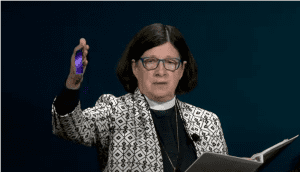
After the apology, Bishop Eaton invited those at the assembly to write their laments and prayers for the church on ribbons and tie them to a cross. That gesture was about as substantial as those flimsy pieces of fabric.
The pilgrimage continues
By the time of the CWA, there were more than 160,000 hits on the different blog pieces that I’ve published about Rev. Nelson and his congregation over the last eight months. Sr. Carvajal hopes that as more people are aware of their congregation’s plight, they will pressure the ELCA to make things right with his church. “We wouldn’t have gotten this far without people sticking up for us,” he said.
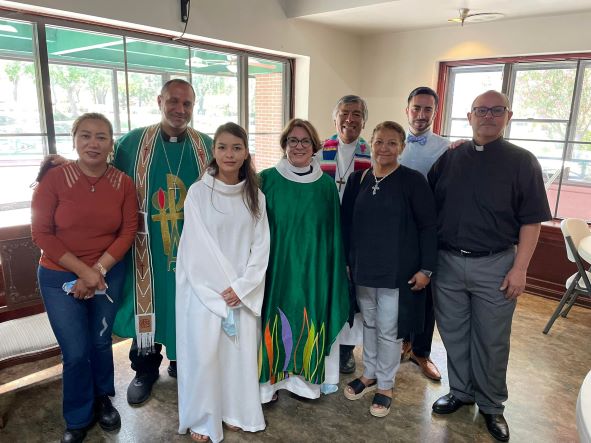
While their future is uncertain, the people of Iglesia Luterana Santa María Peregrina remain strong in their faith. They look forward to a just resolution to their plight and an end to their pilgrimage by the time they gather once again to celebrate El Día de la Virgen de la Guadalupe.
On that day, no one will ask, “Where is Pastor Nelson?” Because he will be right where God has called him – leading worship, caring for his congregation, inspiring his community, and strengthening them to be a blessing of hope for all who stand up for justice.
How can you help?
While we wait for the investigations to reveal the truth, and while we wait for the ELCA to help Rev. Nelson and his congregation, there are things that individuals can do to show their support.
Contact the ELCA Churchwide Office
Call or email Presiding Bishop Elizabeth Eaton (1-800-638-3522; [email protected]) and ask for two things:
- A public update and full transparency on the investigation into Megan Rohrer.
- Reparations and restitution without delay for Rev. Nelson and Iglesia Luterana Santa María Peregrina.
Support Rev. Claire Burkat, Interim Bishop of the Sierra Pacific Synod
Email Interim Bishop Claire Burkat ([email protected]) to express your support for the following:
- A full, public, and transparent investigation into the case of Rev. Nelson Rabell González.
- Reparations and restitution without delay for Rev. Nelson and Iglesia Luterana Santa María Peregrina.
Support Iglesia Luterana Santa María Peregrina and Rev. Nelson
If you would like to make a donation to support the ministry of the congregation, click here:
https://www.paypal.com/paypalme/ILSMP
If you would like to help Rev. Rabell and his family, you can donate using any of these links:
Cash App: https://cash.app/ $NelsonRabell.
PayPal https://www.paypal.com/ @NelsonRabell.
Venmo: https://venmo.com/ @Nelson-Rabell.
** The original version of this article relayed incorrect information about Memorial B11. My apologies to Rev. Foss, and my thanks to her for providing the correction.
Read also:
The ELCA Apology to Iglesia Luterana Santa María Peregrina: What Have We Learned?
Unraveling Rohrer’s Big Lie: New Report about Rev. Nelson Rabell
Bishop William Gohl: Bishop Megan Rohrer’s Actions Warrant Discipline, Removal
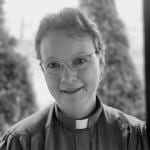
The Rev. Dr. Leah D. Schade is ordained in the ELCA. She does not speak for the ELCA; her opinions are her own. She is the author of Preaching in the Purple Zone: Ministry in the Red-Blue Divide (Rowman & Littlefield, 2019) and Creation-Crisis Preaching: Ecology, Theology, and the Pulpit (Chalice Press, 2015). She is the co-editor of Rooted and Rising: Voices of Courage in a Time of Climate Crisis (Rowman & Littlefield, 2019). Her latest book, co-written with Jerry Sumney is Apocalypse When?: A Guide to Interpreting and Preaching Apocalyptic Texts (Wipf & Stock, 2020).
Twitter: @LeahSchade
Facebook: https://www.facebook.com/LeahDSchade/


